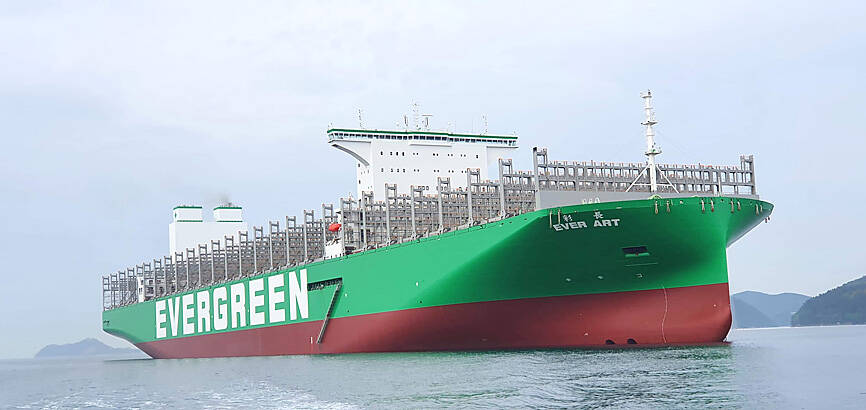Evergreen Marine Corp (長榮海運) and Yang Ming Marine Transport Corp (陽明海運) this year granted substantially large year-end bonuses to employees given strong profits, despite a decline in shipping rates this quarter.
Evergreen Marine, the nation’s largest container shipping company, distributed year-end bonuses of as much as 52 months wages to some of its employees yesterday, higher than the 40 months it offered last year, the Chinese-language Liberty Times (sister newspaper of the Taipei Times), reported yesterday.
Most employees were rewarded with year-end bonuses ranging from 10 to 45 months of wages, while those demonstrating superior job performances received the equivalent of 52 months of salary, the report said.

Photo courtesy of Evergreen Marine Corp
Evergreen declined to confirm the report or answer questions about the bonuses. It only said that each employee was compensated based on their performance.
Evergreen reported a net profit of NT$304.35 billion (US$9.91 billion) during the first three quarters of the year, up 92 percent year-on-year, or earning per share of NT$68.88, corporate data showed.
Evergreen’s local rival, Yang Ming Marine, planned to reward its employees with up to 13 months of their monthly salary, the Liberty Times reported yesterday.
The shipper’s net profit surged 51 percent year-on-year to NT$165.85 billion in the first three quarters of the year.
The company’s earnings per share were NT$46.97, up from NT$32.42 a year earlier, corporate data showed.
The shipping companies said that the significant revenue growth was a result of rising freight rates amid labor shortages and congestion at ports around the world amid the COVID-19 pandemic.
Evergreen shares gained 1.88 percent to NT$163, while Yang Ming shares rose 1.08 percent to NT$65.5 in Taipei trading yesterday.

UNCERTAINTY: Innolux activated a stringent supply chain management mechanism, as it did during the COVID-19 pandemic, to ensure optimal inventory levels for customers Flat-panel display makers AUO Corp (友達) and Innolux Corp (群創) yesterday said that about 12 to 20 percent of their display business is at risk of potential US tariffs and that they would relocate production or shipment destinations to mitigate the levies’ effects. US tariffs would have a direct impact of US$200 million on AUO’s revenue, company chairman Paul Peng (彭雙浪) told reporters on the sidelines of the Touch Taiwan trade show in Taipei yesterday. That would make up about 12 percent of the company’s overall revenue. To cope with the tariff uncertainty, AUO plans to allocate its production to manufacturing facilities in

Taiwan will prioritize the development of silicon photonics by taking advantage of its strength in the semiconductor industry to build another shield to protect the local economy, National Development Council (NDC) Minister Paul Liu (劉鏡清) said yesterday. Speaking at a meeting of the legislature’s Economics Committee, Liu said Taiwan already has the artificial intelligence (AI) industry as a shield, after the semiconductor industry, to safeguard the country, and is looking at new unique fields to build more economic shields. While Taiwan will further strengthen its existing shields, over the longer term, the country is determined to focus on such potential segments as

TAKING STOCK: A Taiwanese cookware firm in Vietnam urged customers to assess inventory or place orders early so shipments can reach the US while tariffs are paused Taiwanese businesses in Vietnam are exploring alternatives after the White House imposed a 46 percent import duty on Vietnamese goods, following US President Donald Trump’s announcement of “reciprocal” tariffs on the US’ trading partners. Lo Shih-liang (羅世良), chairman of Brico Industry Co (裕茂工業), a Taiwanese company that manufactures cast iron cookware and stove components in Vietnam, said that more than 40 percent of his business was tied to the US market, describing the constant US policy shifts as an emotional roller coaster. “I work during the day and stay up all night watching the news. I’ve been following US news until 3am

COLLABORATION: Given Taiwan’s key position in global supply chains, the US firm is discussing strategies with local partners and clients to deal with global uncertainties Advanced Micro Devices Inc (AMD) yesterday said it is meeting with local ecosystem partners, including Taiwan Semiconductor Manufacturing Co (TSMC, 台積電), to discuss strategies, including long-term manufacturing, to navigate uncertainties such as US tariffs, as Taiwan occupies an important position in global supply chains. AMD chief executive officer Lisa Su (蘇姿丰) told reporters that Taiwan is an important part of the chip designer’s ecosystem and she is discussing with partners and customers in Taiwan to forge strong collaborations on different areas during this critical period. AMD has just become the first artificial-intelligence (AI) server chip customer of TSMC to utilize its advanced